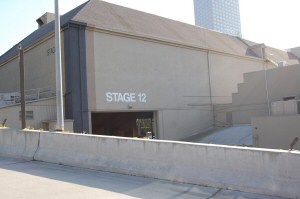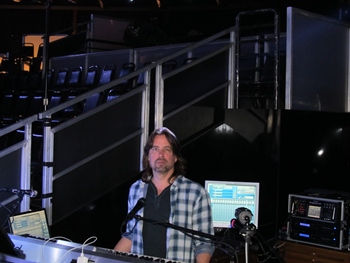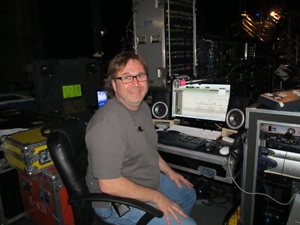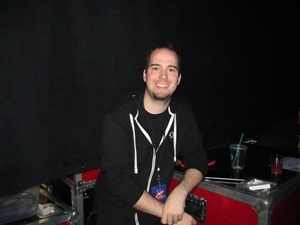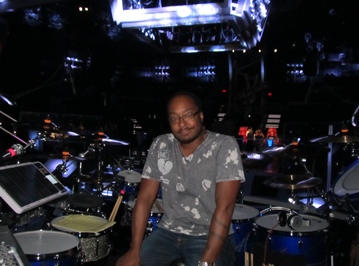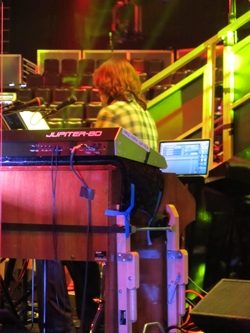
|
Interview with Paul Mirkovich, Keyboardist and Music Directory for the NBC primetime hit THE VOICE October, 2012 Take a 30,000 square foot soundstage on Universal Studio's backlot. Make it a famous one, one of the 10 largest in the world, where Jurassic Park, Pirates of the Caribbean, Back to the Future, Batman Returns, and several dozen other major films were shot.
Add 145,000 pounds of lights (so many that you can feel the heat they throw off from 20 feet away). Mix in tons of air conditioning to keep from over-cooking, then add two flying jibs with state-of-the-art cameras and several steadicams. Carefully add 400 seats, combine with a massive JBL Line-Array front-of-house sound reinforcement system driven with the audio from an absolutely world-class band, consisting of 2 keyboardists, 2 guitarists, a bass player, drummer, and percussionist. Season with a 165 person crew of top-notch music and TV directors, producers, engineers, music supervisors, construction leads, runners, grips, and gaffers.
Once fully baked, top with four chairs that rotate. Place four of the most accomplished singers across all genres into those chairs. Sprinkle with a stunning variety of hit music performed by 64 very promising singers. What is the end result? The hit NBC music talent show that has taken the world by storm called The Voice. Being a music show, the key to its success is, well, its music. Without a killer band to back up the competitors, and help them sound their very best, the show would simply fall flat. After all, at the end of the day, it's all about the music. And the four judges know music. Adam Levine, CeeLo Green, Blake Shelton, and Christina Aguilera need no introduction. As four of the biggest stars the music industry has ever known, these judges have paid their dues and risen to the top ranks of the music industry, sharing their knowledge and wisdom about vocal technique and the art of performing a song with the teams they select as the season progresses. Great songs, performed by a great band, sung with heart and soul by the promising young talent.
The leader of this band is none other than Paul Mirkovich, who started on his musical journey at a very young age. His diligence and hard work paid off, preparing him to land high-profile gigs as the music director and keyboardist with some of the biggest acts in the business, including Janet Jackson, Cher, PINK!, Whitesnake, Foreigner, and previous television gigs including the Mark Burnett production of ROCKSTAR that received widespread acclaim for it's superb band. We caught up with the insanely busy Paul during a rehearsal of Season 3 of The VOICE, a nd got some insight as to what it's like to lead a band in one of the most popular shows on television. Tell us a little about the path that got you to where you are today. I've been playing music since I was four years old, playing piano by ear when I was four, then taking lessons when I was 6, and studying classical piano right up to my teens. I was never a great classical pianist, but it was a great foundation. I started playing jazz and rock n' roll in high school, and got my first synth when I was about 18... a Korg Poly Six and a DX7.
What was your first big gig? Well in High School, I played some Broadway Musicals, and when I was 16 I was hired to be the Music Director at a Church in North Hollywood. It paid $1000 for three months of work... pretty amazing money back then for a 16-year old. Even more amazing was that all the guys playing in the musical were local studio musicians, because they also attended that Church! So there I am directing this pit orchestra with Joe Porcaro on drums... it was a big education for me, and helped me realize how good you have to be to make it.
Where did you go after High School? I attended the Dick Grove School of Music, a private music school that at the time was a sensational place to learn from some really heavy hitters in the business. We had people like Henry Mancini, Lalo Schiffrin, and Claire Fisher on staff. Great teachers, just down the street really. After studying there, I did a couple more years playing musicals and local gigs a round town, and then in 1986 I got my first tour playing keyboards with a guy name Jeffrey Osborne.
You mean the guy who recorded "On the Wings of Love" and "Stay with Me Tonight?" That's the one... It was an eye opener for me since I had never been out of LA, much less being the only white guy playing keys on a nation-wide tour with a black R&B superstar. A couple years after that I got the opportunity to work with Cher, who I still work with, and also did some touring with Whitesnake doing the "rock thing". And all along the way, I was always the guy people would turn to figure out a chord, or deal with an arrangement, and with Cher I was officially the Music Director.
Let's talk a bit about the gear you use. You first started using the RECEPTOR hardware plug-in player with the show "ROCKSTAR", and you've been using it ever since. How did RECEPTOR become such an important piece of gear in your rack? I had actually worked on TV shows before ROCKSTAR, and I was probably one of the first guys to use VSTs live. I loved virtual instrument technology, but trying to run that kind of thing on a laptop is terrible - they crash all the time and the reliability is awful. I remember when I first heard about Muse, I thought, "Maybe this is the solution I'm looking for" so I contacted the company. The fact that virtual instruments sound so great, and re-create vintage sounds without any of the hassles is great, and I've been using RECEPTOR ever since.
Aren't many of the guys in the band for The Voice guys that also played on ROCKSTAR? How did you call come together? There was a big audition held by Mark Burnett productions... I think there were 12 different bands competing for the gig. Our band was a bunch of players I knew from working with PINK! - all great musicians. I remember thinking "What could we do that was really ambitious, and something that no one else would even try to attempt?" So with five singers in the band, we decided to work up a rendition of Queen's "Bohemian Rhapsody". We had all the parts spot-on, and it was the first thing we played. From what I've been told, Mark Burnett was actually there at the audition, and said "well, that's the band, I don't know why you'd even listen to anyone else" After the auditions, they moved a couple of people around, including putting Nate in the drum chair (who I knew but had never worked with) and also putting Jim in as a utility player who worked with me on Cher. I still think it's the best rock band to ever play on a TV show.
I was blown away with some of the playing on that show... Its ridiculous what we were able to do, and what they let us do, playing some outrageous rock anthems during prime time, complete with guitar solos and the like. Of course that's all changed now, and all the numbers have been cut to a minute thirty or two minutes across all the music shows, and all the instrumental sections and solos have been cut, since the shows are intended to feature vocal talent. But "Rockstar" is still the most fun I've had on any show, simply because they really let us cut loose on all the songs.
Let's get back to some gear questions. You have already mentioned your love of virtual instruments. How has this technology empowered you as a musician or as a music director? Well, the obvious thing is that virtual instruments really expand your palette of sounds, but it's also the uniqueness of the sounds themselves as well. I have a lot of Roland gear on stage, and I love the Roland sound, but the fact is that Roland gear doesn't sound like a classic Oberheim, or a Moog, nor do they have the huge sample libraries that are available with something like Kontakt. There are all these incredibly cool companies like Rob Papen making really cool synths that are very unique, and some of the other niche synth creators that have sounds that you can't make with anything else. And all these cool sounds weren't really playable live until the Receptor came along, and made it easy, reliable and consistently effective to play virtual instruments and effects live without having to worry about anything.
What percentage of the sounds you use are coming from RECEPTOR? Well I have a real B3 on stage, so the organ sounds come from the B3. And a lot of the piano sounds come from the V Piano, but I often use the RECEPTOR to add a layer of filtered or effected pianos. I tend to layer a lot, so I might have one sound from the G8 layered with three or four things coming from the RECEPTOR. So RECEPTOR contributes heavily to most things I play.
I remember you once told me that you use a lot of layers, and layering various synths together is the key not only to making something sound big, but also making something unique. Tell us a bit more about how RECEPTOR makes it possible to create complex layers easily. Well, it depends on the song, of course. If I play something from the classic rock era, I might use Lounge Lizard by itself, but if it is a bit more modern I might layer it with an EP patch from the Roland. Or if it needs a bit more bell sound, I might layer Lounge Lizard with a patch from FM8 to add some additional high end. Even something as simple as a string patch benefits from layering, since LA Studio Strings (in Kontakt) sounds one way, and Symphobia (in Kontakt) sounds another way, and layering them together gives you something that is completely different than either of the two by themselves.
Do you tend to use a lot of factory presets, or do you create your own presets from scratch? I tend to start with factory presets and then tweak them to my specific needs, modifying them to suit the particular song or situation.
Do you have any "go to" plug-ins that you use a lot? Wow... that's hard, because there are so many good ones. I use a lot of Kontakt first and foremost, because I have huge libraries of sampled sounds. I also use NI Massive, as well as Spectrasonics' Omnisphere. I still use a lot of Atmosphere even though it's a bit long in the tooth, but it runs great on RECEPTOR so I still use it. I like Rod Papen's Predator, and Applied Acoustics Lounge Lizard is my go-to electric piano, and I use Ultra Analog. I use Vanguard, and OPX-Pro a lot, and FM8 for the DX sounds... I use a lot of plug-ins in general because they all do different things and they each one has a different philosophy in their approach to synthesis.
I see that you have a laptop on stage. What are you using that for? I have a laptop for running Receptor Remote software so I can make tweaks to the sounds. I can email too with it.
Let's back up a bit and talk about your life during the course of the TV season. When do you get involved with the contestants, rehearsals, etc.? How does the season unfold for you? The large-scale auditions involve thousands of potential contestants, and those are held all around the country. I'm not involved in that at all. Once the large-scale auditions are complete, I get involved when they bring the top 200 contestants to Burbank for further auditions at Center Stage. Those auditions are held in front of the casting people and executives from NBC, along with producers from Mark Burnett productions and Talpa Productions (who originated the show in Denmark) Those auditions are live with the contestants singing to a track, or sometimes with me playing keyboards, or accompanied by a guitarist. After that we all give our 2 cents as to who should go through, so that group of 200 is reduced to about 150 or so, and those 150 go through to the blind auditions. I think this season we had about 138 people perform in front of the judges before the teams of 16 are filled. The basic process starts with large-scale auditions, moving on to show selection auditions. From there it goes on to the blind auditions where they select the teams, and then on to the battle and face-off rounds. Then its on to the live shows (when viewers at home get to vote) where the coaches work closely with the contestants for each performance. Of course each round has different songs being performed.
Wow. That's a lot of singing and a ton of songs. Who actually picks the songs that will be performed? Its actually a combination of the producers, myself, the coaches, some people at NBC... there are a lot of people involved. We give suggestions to the coaches, and they have the ultimate say as to who is going to sing what.
Who does all the arrangements? Me, with input from the band. We try to keep things as close to the original as possible, but often we have to take a five minute song and make it two or two and a half minutes long. So the first thing I do is cut the song down to figure out what parts of the song we're going to do. After that, we don't know if the performer is going to perform the song like the original, or do something crazy and different. For example, we're doing the song "Lights", and itís a dance tune but the people performing it are indie artists, so they aren't going to do it as a dance song. So we're re-arranging it with piano, strings, harps, and synths, creating a totally different vibe. But we don't know that a song is going to change directions like this until they walk in on the first day of rehearsals.
So when you guys are learning a new song, how hard do you try to recreate the sound of the original recording or artist? Well, it's always different than the original. On "Rockstar", we would play songs by INXS, or The Rolling Stones, and we'd play them well, but when INXS would come in and play the same songs, the difference was immediately apparent. We try to get as close to the track as possible, but other musicians wouldn't be fooled because the Rolling Stones are the Rolling Stones and there's no way we can be them.
How much time do you typically have between the time you know what song you are going to play and actually performing it? How many songs do you learn each week? It depends on where we're at in the show. Just yesterday we learned 16 new songs, so the whole process happens pretty fast. Its funny, the Maroon 5 guys were in the next studio over from us, and we hung out with them a bit. We mentioned we had just learned 16 songs and their response was "Dude, we only KNOW 16 songs". So it's a pretty different than being in a band and playing a catalog of songs from your records. Right now we're in the battle rounds, so we have two weeks to get 32 songs together for these rounds, which involved sessions with the coaches, and then additional sessions with the coach and the band. But in the midst of learning the 32 songs in prep for the battle rounds, we had to learn 64 more songs in prep for the face-off rounds. So we basically had about three or three and a half weeks to learn 96 songs.
Amazing! How does that work? You send a list of songs around to all the band and then what? The band must be incredible readers... Surprisingly, that's not the case. In fact, most of the guys in the band aren't incredible readers. In fact in my experience, a lot of musicians who make a living on tour aren't very good readers at all, but that doesn't mean they aren't incredible musicians. But through time, and I've been at it 30 years playing in everything from Broadway shows to bebop jazz to funk bands, you just learn a lot of songs. So a lot of the time its just a matter of saying "we're doing this song" and the band members typically say, "yeah, we know that" and if they don't they listen to it a few times and they have it down.
Now a lot of the performer's songs are actually recorded during the season, so that viewers can purchase the performances on iTunes. How does that work? Typically we'll rehearse on Thursday, record on Friday with the band, record all the vocals on Saturday, and then mix and get everything delivered to iTunes by Sunday at noon. Its crazy... during the recording times Bill the engineer is working three days straight without any sleep.
Obviously the coaches are incredibly busy people... What is their involvement during the week, and how much time do the contestants actually get to spend with their coaches? The coaches come in only on show days, so typically they are in two days a week. But there is real coaching going on! Its actually amazing what 20 or 30 minutes of the coach's time can do for someone who is willing to learn, and that kind of coaching is something that you just can't buy. So for example, when a pair of singers are prepping for the battle round, each coach breaks down what each person is going to sing, giving them performance hints and tips, with real notes on their style and technique. And 45 minutes with some of the finest performers of our generation is pretty amazing. Plus the singers work with us, so we'll give them not only the first day but also the second. So the contestants learn A LOT during the process.
What is a typical day like when you are actually filming or doing the show live? At this point it's actually getting easier for us because now we know so many songs, but it is a 7-day per week gig, and many hours each day; minimum 8 hours during pre-production, and up to 18 hours when we are doing the live shows. An easy day is a 10 o'clock call, and a 7 o'clock wrap, but then there is the homework where you have to learn the songs on y our own and get ready for the next day. We have to know the songs before we come in for the day, and typically there is one day between learning the song before performing it with the contestants. We'll typically run a song down 2 or 3 times to get it down as a band, and then run it 2 or 3 songs with the contestant in rehearsal, and then we're on stage where we might run it a couple more times. We push them through pretty quick so maybe we'll run a song 10 or 12 times total between the time we first learn it and the time it either taped or performed on live television.
Are you one of those guys that can hear a song and determine what the chords are, and what inversions are being used, without actually playing it? Oh yeah. But pop songs are not too complex... I can hear the song and figure out what is going on, and know what chord and what voicing is being used. At this point we know probably 800 songs, so you get a lot of practice figuring the songs out...
How would you describe the different skills between a band that plays on television and a band that plays on tour? For one, the skills are not that different. However, some studio band people don't play with a lot of fire. The guys I hire have been on lots of tours, and they know that you have to bring it whenever you perform, and the attitude needs to be that you are kicking ass and taking names. There are "touring chops" that allow you to play the songs from the album incredibly well, and your improvisational skills will be well honed because you might have a soloing opportunity every night. But on TV, there is a lot more pressure to play the part perfectly every time. On TV, if you make a mistake it's there forever, but if you make a mistake live, you laugh about it with the guys in the band and that's it. But when you play on TV, especially live, you know the performance lives on so you have to nail it. Also, on TV, the ability to learn things quickly and think on your feet is important; if something happens you need to adjust on the fly, so there's a different mindset than the touring mindset. Failure is not an option; when you are faced with learning 150 songs in 12 days, you can't even think that its impossible, you just have to do it.
Does classical training help with the prep for a gig like this, where you have to quickly digest a new work and be able to perform it with minimal amounts of rehearsal? A classical background helps you to play almost anything, and it's definitely helped me, but being proficient on your instrument is by far the most important skill.
What is your favorite part of the show?
That's an easy question: playing with this band. It's really fun to play with such great players. They are pretty much the best in the business.
What is the least favorite part of doing a show like this? Well, the fact you have to work 18 or 20-hour days is one thing. And the fact that there are so many people you need to please can be challenging: the coaches, the people from NBC, Universal, Talpa, and Mark Burnett, and of course the singers. Don't get me wrong, they are all nice people, but they all have opinions, and all their opinions are valid. Music is one of those things where everyone knows what they like and don't like, so you have to listen to everybody, and recognize that all everyone's opinions are valid.
With so many entities involved, is it hard to know who to listen to first? Well, there are definitely some who have opinions that matter more than others, starting with the coaches, of course. Then there's Mark Burnett, some executives at NBC and Talpa who are very sharp people and are the big bosses whom you need to please. These are all very sharp people, and you'd be foolish not to listen to them, not only because you'd get fired, but also because they obviously know what they are doing.
Do you encounter divergent opinions about what to do or what direction to go? There are divergent opinions on a regular basis, and that is why it can be difficult. This particular show is very important, so the producers and executives are actively involved, not only because the show is doing really well but also because it's music, so it's fun!
How would you compare doing this job versus touring with say Janet Jackson or PINK!? This is a lot harder. A tour has a 6-week period of rehearsals getting the show together, then once the 2-hour show is in place, its a matter of just doing tweaks here and there to refine a long-form show. But with The Voice, we're constantly doing new music with a lot more songs and getting it all done on a deadline, before you're on to the next group of songs, so its a much more dynamic and changeable environment.
How much time do you have to spend on managerial things as opposed to musical things? It's about half and half. There are so many personal relationships between myself and the coaches, and the interaction with all the producers and executives, so you spend a lot of time on those interactions, making sure everyone knows that they've been heard. There's a lot of communication involved, and itís exhausting. The musical part of it is energizing, but the interaction and communication overhead that can be really exhausting.
Is it all worth it? You'd have to ask my wife (laughs). It's worth it because I think we do things at a high level, considerably better than any of the other music shows, and we have a great team of supportive people on the production side that want the music to be great. I'm proud of what we do, but it's a ton of work.
What advice would you give to someone who wanted to follow in your footsteps? Become a Doctor... the hours are better. (laughs). Actually, my advice is to do your homework and always be prepared. I've always thought that I'm a good player and good musician, but there are many others who are more naturally gifted than I am. But I've always thought that if anyone is going to work an hour on something, I'm going to work three. So if a competitor is going to be prepared in a certain way, I'll be 2 to 3X more prepared than they are. And as a music director, I'm going to know what I'm supposed to play, and every note that everyone else is supposed to play on every song. I know this band will be prepared. And this band knows that I'll know if they aren't prepared, since its my job to know every note that everyone is supposed to play. That being said, with this band at this point, I can kind of ease up a bit because they know the level of performance I expect, and they are professional enough to expect that same level of musicianship from themselves.
So if you want to succeed at something, be prepared.
Paul Mirkovich is a West-Coast-based music director, keyboardist, programmer, arranger, vocalist, and music systems consultant who has worked with some of the biggest stars in the business, including Cher, Whitesnake, Janet Jackson, PINK!, and Peter Gabriel. Paul made the leap to television as the Music Director/Keyboardist of the Mark Burnett Production" ROCKSTAR", and is now in his third season as the MD and keyboardist in the latest Mark Burnett production, the smash-hit NBC music show, "The VOICE". |



